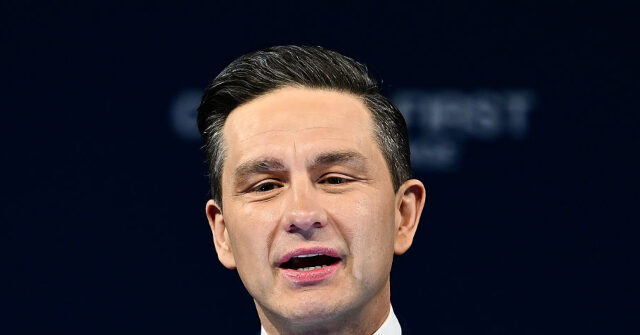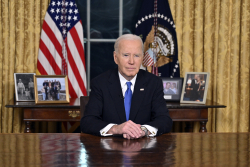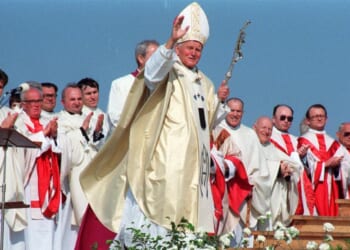After a weeklong respite from the public eye, Conservative Party leader Pierre Poilievre of Canada announced a plan on Monday to return to Parliament and seize the leadership of the party after a catastrophic defeat against current Prime Minister Mark Carney, who has been in politics for a grand total of nearly five months.
Poilievre, alongside wife Anaida, appeared in a video on social media admitting that he seeks to “learn and grow” from Canada’s general election on April 28, which the Conservatives lost after enjoying a 26-point lead in early 2025. Poilievre himself lost a Parliament seat he had held since 2005 when he was first elected at the age of 25. The learning and growing process that he detailed did not involve handing the reins of the party to anyone else or him personally seeking experience outside of Parliament.
“It didn’t go how we wanted but, when you get knocked down, you get up and get going,” Poilievre declared in his video message, thanking supporters and noting that, despite his own failures, the Conservative Party won an extra 25 seats and made significant improvements in support from young voters and the working class.
“Now, it wasn’t enough. We didn’t get over the finish line, which means that I need to learn and grow and our team needs to expand,” Poilievre observed. “That will be my mission, and we’ve got a path with a path to get elected back into Parliament as soon as possible… we’ll be holding the government to account.”
“Easy street leads to a dead end and the hardest paths lead to the best destination,” Poilievre concluded.
Poilievre will be running to replace Member of Parliament Damien Kurek, who won his seat handily in the Battle River-Crowfoot district of Alberta but has announced plans to resign to make way for Poilievre to return to the legislature. Poilievre previously represented the Carleton district of Ontario for 20 years, about 2,000 miles from Battle River, Alberta. The former leader accepted Kurek’s offer to resign with “humility,” he announced on Friday. Kurek is campaigning alongside him throughout the district.
To lead a Canadian political party and pursue the prime ministership, aspiring leaders must hold Parliamentary seats, meaning Poilievre will be replaced by an interim leader currently. If he wins the Battle River-Crowfoot seat, Conservatives have reportedly agreed to return him to their leadership.
Poilievre was elected Conservative leader in 2022, at the height of Liberal leadership under radical leftist Prime Minister Justin Trudeau. The Conservatives had recently failed to force Trudeau out of power after a series of photos and videos leaked of the head of government wearing “blackface,” “brownface,” and other racist makeup. Trudeau admitted to the racist episodes, lamenting, “I’ve always… been more enthusiastic about costumes than is sometimes appropriate.” Trudeau told reporters that he had worn “blackface” so many times that he was “wary” about stating conclusively that more images of him in racist garb did not exist.
By 2022, however, the more recent Trudeau scandal was the outrageous human rights abuses committed by the government in the name of containing the Wuhan coronavirus, including a particularly violent episode in which Canadian police on horseback trampled a protesting indigenous elder. Poilievre was among the limited government voices at the time supporting the “Freedom Convoy,” a trucker-led protest movement defending civil rights against coronavirus-related abuses.
Trudeau ultimately stayed in power for three more years, resigning in January after becoming widely unpopular for his poor handling of President Donald Trump’s threats to impose tariffs on the country. At the height of Trudeau’s disapproval this year, the Conservative Party was polling at around 46 percent, compared to 20 percent for the Liberals and 19 percent for the far-left New Democrats (NDP). The NDP ultimately cratered in the April 28 election, resulting in the resignation of longtime leader Jagmeet Singh. The Conservatives also lost following the replacement of Trudeau with current Prime Minister Mark Carney, who announced his run to lead the Liberals in January after decades of working in banking and advising the Trudeau administration on issues such as climate alarmism and coronavirus policy.
While campaigning, Poilievre focused on equating Carney with Trudeau but did not capitalize on Carney’s alarming relationship with the Chinese Communist Party, the Liberals’ normalization of euthanasia as an option for mental health patients, or immigration as top issues. He also attracted no significant international conservative support. The world’s most prominent conservative head of state, President Donald Trump, endorsed Carney and called Poilievre, “stupidly, no friend of mine.”
Conservatives, Canadian media reported this week, are nonetheless united behind Poilievre. The National Post reported that the party is expected to hold a “post-mortem” meeting to assess how to improve their performance in the next race — one presided over by Poilievre in which no members are expected to question his leadership or hold him accountable.
“Conservative MPs and insiders who spoke to National Post did not lay the blame on Poilievre, whom they said was busy crisscrossing the country,” the newspaper detailed, “but rather the operational and internal decisions spearheaded by [campaign manager Jenni] Byrne during the campaign.”
“I think caucus and staff in general, pretty much everyone is united behind Pierre, and there is no one that thinks he doesn’t deserve to stick around, as far as I can tell,” an anonymous “Conservative source” shared.
“That’s not Pierre Poilievre’s fault,” former minister Peter MacKay added. “He’s trying to crisscross the country and get to as many places as he possibly can. Surely, job one of the campaign team is to win the riding of the leader.”
MacKay noted that Conservatives left “90 unfilled nominations,” seats they may have won, and blamed the campaign leadership for inadequate recruiting.















